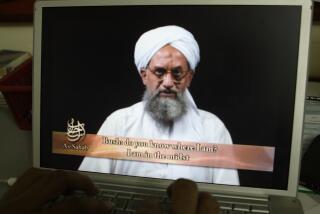State Dept. Report Cites Growing Reach of Bin Laden
- Share via
WASHINGTON — Osama Bin Laden, the fugitive Saudi extremist who allegedly masterminded the 1998 bombing of two U.S. embassies in East Africa, has sent terrorist trainers to at least seven countries, the State Department said Monday.
Bin Laden’s growing role was underscored in the department’s annual review of terrorism. Bin Laden was the only individual singled out for a page-long profile in the 107-page report.
His organization, the department said, has sent terrorist trainers throughout Afghanistan, where he has been given sanctuary by the ruling Taliban, as well as to Tajikistan, Bosnia-Herzegovina, Somalia, Sudan, Yemen and the separatist Chechen republic in Russia.
The group also has trained fighters from other countries, the report said, including the Philippines, Egypt, Libya, Pakistan and Eritrea. As a result, “Bin Laden believes he can call upon individuals and groups virtually worldwide to conduct terrorist attacks,” the report warned.
The U.S. wants to try Bin Laden on charges of planning the bombing of the U.S. embassies in Kenya and Tanzania that killed 224 people. Afghanistan has resisted pressure to hand him over.
In unusually harsh language, the report also criticized Pakistan, a staunch Cold War ally, saying it “continues to send mixed messages on terrorism.”
“Despite significant and material cooperation in some areas, particularly arrests and extraditions, the Pakistani government also has tolerated terrorists living and moving freely within its territory,” the report said. It added that Pakistan continues to support militant groups in the long insurgency against Indian control of the disputed Himalayan region of Kashmir.
Pakistan’s government has denied any support for terrorism.
Rep. Sam Gejdenson (D-Conn.), the ranking Democrat on the House International Relations Committee, on Monday called for hearings into Pakistan’s alleged support of terrorism.
Bin Laden, the 17th son of a Saudi construction tycoon, first drew notice in the early 1980s, when he helped finance, recruit, transport and train Arab volunteers in the war against Soviet forces in Afghanistan. He founded Al Qaida, or the Base, as his operational organization for “like-minded extremists” during the war, according to the report.
Bin Laden’s primary goals now are to drive U.S. forces from the Arabian Peninsula, to remove the Saudi ruling family from power and to “liberate Palestine,” the report said. His secondary goals are to remove Western military forces and to overthrow what he calls corrupt Western-oriented governments in predominantly Muslim countries.
Al Qaida has become a far-flung network with supporters around the world.
Bin Laden’s operations in Afghanistan, including terrorist training camps, were largely responsible for the report’s broader conclusion that the nexus of global terrorism is moving from its traditional base in the Middle East to remote regions of South Asia.
The eastward shift became increasingly pronounced last year as several Middle Eastern nations, including Egypt and Jordan, cracked down on terrorist groups. For the first time in years, neither country suffered a major terrorist attack.
“Throughout the Middle East, I can report, there’s improved cooperation in disrupting cells and extraditing terrorists back for trial, and this has paid dividends in the last year,” said Ambassador Michael Sheehan, the State Department’s director of counter-terrorism.
The Clinton administration also claimed some success in its counter-terrorism operations. Five U.S. citizens died in two terrorism-related incidents last year in Uganda and Colombia. The death toll was the lowest in seven years.
Secretary of State Madeleine Albright called the report “largely heartening, one of terrorists caught, plots thwarted and lives saved.”
She said that casualties could have been far higher if Algerian Ahmed Ressam had succeeded in bringing explosives and detonators into the United States from Canada. The suspect was captured while crossing the border northwest of Seattle in mid-December.
Some Algerians arrested in connection with the case have reportedly been linked to Bin Laden; his direct involvement has not been proved.
A separate terrorist plot was uncovered in Jordan last fall, and more than a dozen suspects have been charged with allegedly planning to bomb or attack Western tourists at holy sites during millennium celebrations. Several members of the group had direct links with Bin Laden, investigators say.
Both cases were cited in the report, titled “Patterns of Global Terrorism: 1999,” as evidence of another significant shift.
Loosely organized networks with religious or ideological motives are increasingly replacing tightly structured groups with political objectives, the report said. And with less financial support from “rogue” governments, the new terrorist groups increasingly turn to Bin Laden and other individuals, as well as raise money from blackmail, drug trafficking and other forms of crime.
Despite the broader trends, the department did not change its list of nations that it considers state sponsors of terrorism: Cuba, Iran, Iraq, Libya, North Korea, Sudan and Syria. Being on the list results in stiff economic and diplomatic sanctions.
The State Department singled out the government in Tehran as the “most active state sponsor” of terrorism despite the recent election of moderates in Iran.
It said the Iranian Ministry of Intelligence and Security and the Islamic Revolutionary Guards Corps provide “training, financial and political support” to groups seeking to disrupt the Middle East peace process. The report said Iranian support increased in 1999.
The report said Syria could be removed from the list if a comprehensive Middle East peace agreement is achieved. North Korea and Cuba also were named as candidates for possible removal from the list. Afghanistan is not on the list because Washington does not recognize the Taliban government in Kabul.
More to Read
Sign up for Essential California
The most important California stories and recommendations in your inbox every morning.
You may occasionally receive promotional content from the Los Angeles Times.














